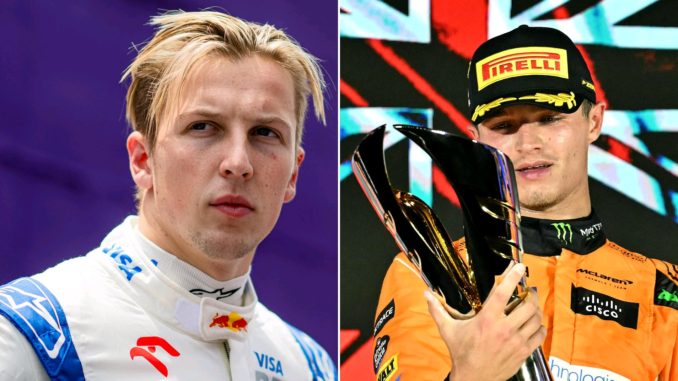
New Zealand Formula 1 driver Liam Lawson has criticized McLaren for playing the United Kingdom’s national anthem following their race victories, considering that the renowned racing team was established by a New Zealand motorsport icon.
McLaren, the most successful Formula 1 team in Britain, was founded in 1963 by Bruce McLaren, a four-time Grand Prix winner.
Lawson, the 10th Kiwi driver to join the F1 grid after taking over Daniel Ricciardo’s spot at RB following this year’s Singapore Grand Prix, thinks it’s ‘utter nonsense’ that McLaren plays God Save the King after victories.
‘This is a New Zealand squad, still referred to as McLaren.’ “I have no clue,” Lawson stated on the Red Flags podcast.
‘Red Bull performs the Austrian national anthem while the team is located in the UK.’ Although McLaren is located in the UK, it is a team from New Zealand.
It’s totally ridiculous, that’s for sure.
Seriously! Especially if you’re from New Zealand… because Bruce McLaren is a true icon.
McLaren plays the British anthem after their race victories because they operate under a British license, having been established in England and remaining based there since the very beginning.
Certain teams have indeed altered their nationality by adjusting their racing license, such as Red Bull and Benetton – however, this does not apply to McLaren.
Nevertheless, the team continues to utilize the papaya color palette that McLaren adopted during its inaugural race win at Spa in 1968, and its initial logo showcased the flightless kiwi bird.
Bruce McLaren, who was also a designer and engineer, was sadly killed in an accident during car testing in Britain in 1970.
He achieved victory in four Formula One races, with his last win occurring at the Belgian Grand Prix in 1968.
Additionally, McLaren finished as the runner-up in the 1960 Formula One drivers’ championship and secured victory at the 24 Hours of Le Mans in 1966.
The racing team, recognized as the second-oldest on the grid, has amassed a total of 188 Formula One race victories, 12 drivers’ championships, and eight constructors’ championships.

Leave a Reply